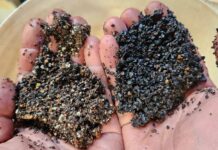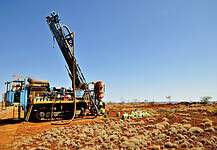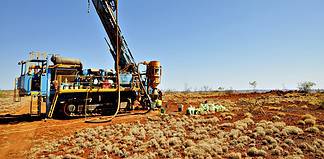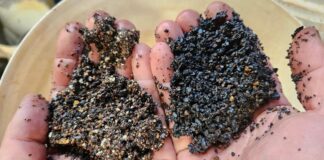All Images: Shark Bay Salt.
Shark Bay Salt (SBS) has been in operation for more than 40 years and wholly owns its two major salt field subsidiaries, Shark Bay Resources and Onslow Salt. Emma Davies spoke with Marketing and Shipping general manager Ben Knight about potential expansion opportunities and the future of the salt market.
- What is the main factor that has led to Shark Bay Salt’s success over the last 40 years?
Situated in the best location for salt production and surrounded by pristine sea water, we have been expanding our production and sales to provide good quality salt to our customers and the constantly growing demand in Asia.
To achieve consistent production of great quality salt, it has been a continuous effort to improve, innovate, and to maintain our salt field, facilities and equipment in excellent condition. All of which are done by our people.
Our people are the most important component of our success.
We have also remained focussed on maintaining long-term relationships with our customers, providing competitive pricing and streamlined logistical services and of course, the highest quality of salt.
2. Annual production is about 4 million tonnes – are there any expansion opportunities being investigated?
Mitsui (of whom Shark Bay Salt is a wholly owned subsidiary) has a strong global network, which continuously provides Shark Bay Salt with opportunities for further expansion into Asia and beyond.
With a forecast increase in demand and a global shortage of solar salt, particularly in the industrial sector, we are currently engaged in studies for further expansion.
In 2016, Onslow Salt increased production capabilities by 500,000 metric tons (mts) to bring Shark Bay Salt’s overall production to 4 million mts as a result of the expansion of crystalliser ponds. Further to this, we are also looking at various options to increase supply capabilities with feasibility studies currently underway to explore options that can increase salt production. These increases will come on the back of improved land utilisation and some other enhancements to our production process.
Maximising these efficiencies through improved land utilisation and enhancements to our production processes is key – this will ensure that Shark Bay Salt continues to be a reliable source of the highest grade solar salt in the Asian seaborne market.
3. How has the residential village benefited SBS employees and the company?
We pride ourselves on employing a permanent residential workforce. The company operates a residential village close to the Shark Bay Resources operation, which provides employees and their families housing, recreational facilities and schooling.
Our employees are provided with private housing with all utilities included. Schooling is administered by the WA Department of Education from prep through to Year 6.
For Shark Bay Resources there are a host of advantages to offering our workforce residential living. These include the opportunity for our workers with families to come home to them every night and attaining a good work-life balance. Housing gives our employees personal space, they reside in their own home without communal dining and fixed meal times. It also organically grows stronger team work because our employees and their families not only work together but they socialise together. It creates a cohesive dynamic.
4. When the public think of salt they think of table salt – how would you explain the vast uses and importance of the commodity?
Salt is one of the oldest and longest traded commodities in the world.
Salt is essential to life with its importance in economical and industrial development around the globe being very well documented. We cannot live without it. Therefore, the need for salt has shaped the history of the human race.
Over time, the technology for producing salt and the range of its uses have developed dramatically.
Salt has a very diverse role in the world, both in its industrial and chemical use through to the salt that is used in food production and in its rawest form, table salt. By volume, salt’s biggest use is in the chlor-alkali industry where approximately 70 per cent of Asian salt demand is derived. This is used in the production of plastics, PVC, alumina and pulp and paper to name a few.
Most manufactured goods that we use in our day-to-day life have salt in in their composition, as such, we expect salt demand will increase stably along with GDP growth in Asian countries.
Our salt is also utilised widely in the food manufacturing and table salt markets across Asia. Indonesia – one of the key markets for Shark Bay Salt – consumes around 400,000 mts of imported solar salt per annum for use in their food production including in the fishing sector (salting and preserving seafood), instant noddle manufacture, in food seasoning and as a preservative.
Salt is also widely used in Japan for pickling various foods and in the production of soya sauces.
5. Do you see market growth for salt in the next five to 10 years?
Steady growth in the world economy is creating organic growth in demand for salt. Most notably chor-alkali demand for salt which has seen the largest increase over the past 12 months and is a trend that we anticipate to continue over the next five to ten years.
Forecasts are for a supply shortage of 20 million metric tons per annum in the Asian seaborne market by 2025. These figures seem optimistic, however there is undoubtedly going to be a very significant supply gap that will in turn put considerable upward pressure on salt prices.
On the back of this, we have seen several Australian and multinational companies looking to develop salt fields in North-Western Australia to capitalise on this supply shortage.
There is strong demand for our salt both in the Asian industrial sector for its superior yield in the chlor-alkali process and in the food segment owing to its purity.
With opportunities for expansion and with our operations strategically located in close proximity to the growing Asian markets, Shark Bay Salt is well positioned to ensure a steady supply of highest-quality salt to meet the market’s requirements for years to come.








































